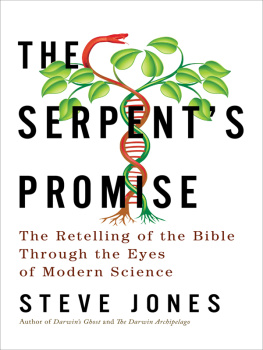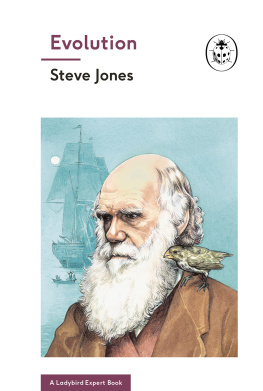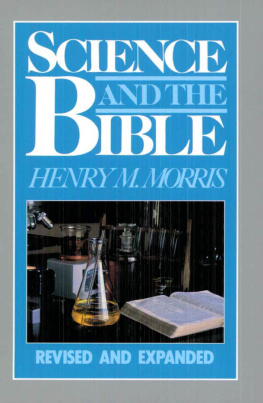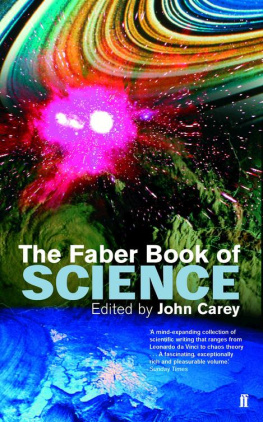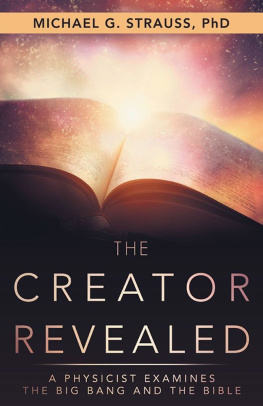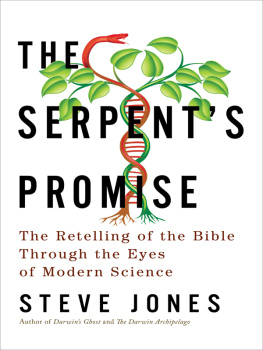
Also By Steve Jones
The Language of the Genes
In the Blood
Almost Like a Whale
Y: The Descent of Men
The Single Helix
Coral: A Pessimist in Paradise
Darwins Island
THE
SERPENTS PROMISE
THE BIBLE INTERPRETED THROUGH MODERN SCIENCE
STEVE JONES

To the memory of my great-grandfather William Morgan, for forty years preacher at Capel-y-Garn, Bow Street, Ceredigion
CONTENTS
What, it will be Questiond, When the Sun rises do you not see a round Disk of fire somewhat like a Guinea O no no I see an Innumerable company of the Heavenly host crying Holy Holy Holy is the Lord God Almighty.
William Blake,
Notebook on a Vision of the Last Judgement (1810)
The one duty we owe to history is to rewrite it.
Oscar Wilde,
The Critic as Artist (1881)
Given the greater biblical literacy in the United States compared to that in Britain, perhaps I should add a few words to this edition in an attempt to clarify what the book is and more important what it is not. The Serpents Promise has, as subtitle, The Bible Interpreted Through Modern Science. The reaction by some among the faithful on my side of the Atlantic to that phrase was that of a Calvinist to a consecrated wafer: whatever the merits or otherwise of the titbit on offer, some believers could not swallow it: Cue heavenly choir of white-coated lab dwellers... worshipping the Great Beard of Darwin, which looks remarkably like that of God or, if you prefer, a re-cranking of the Darwinian barrel organ accompanied by the monkey of New Atheism, of course, as it screeches petulantly at religion.
Such comments misunderstand what I have aimed to do. This volume tries to interpret the Good Book not from the point of view of an atheist (which I happen to be) but to read parts of it as an early attempt to make sense of the physical world and hence as an ancestor of todays science. What have we found out in the past two millennia and more about the origin of life, about inborn fate, about the visions of the prophets or even about religion itself? Can science ever hope to explain why we do unto others by acting in a way that diminishes our own prospects while benefitting those of our fellows?
The Serpents Promise tries to answer those questions and others like them. It is not an attack on belief but a journey into what might be called Dawkins Canyon; the yawning chasm between the faithful and their opposites which is, in truth, filled with a variety of remarkable creatures. Adam and Eve are, as genetics makes clear, more than mere models of the loss of innocence that comes with carnal knowledge. Instead they were the real ancestors of every man and every woman today. Although Leviticus obsession with purity is often interpreted as a sermon on moral spotlessness, it contains a hidden truth, for his set of rules of cleanliness was written, as cities grew and travel increased, to provide just the conditions needed to spark off epidemics. For some, the Flood is a parable that tells believers that the Lord punishes sinners and makes a covenant with those who follow in his ways. I concentrate instead on the geological evidence of past disaster and on the deluge to come as climate change gallops out of control.
The noble prose of the King James Bible can provoke an emotional response even in a determined unbeliever (I am less confident about some of the newer translations), but as an explanation of physical events the Bible itself, unsurprisingly given its age, in many cases fails. Sciences job is to dispel mysteries, not to invent them, and, as I hope to show here, it often does the job better than do metaphysical stories. And, on the way, science can provide real insights into the world and into ourselves.
There are of course many things that lie beyond its powers. My book avoids anything not open to rational explanation. The Afterlife, the Resurrection, even God himself are central to belief, but science can neither confirm nor deny such notions, for they are based on spirituality alone. One correspondent bemoaned the fact that Jesus is not even in the index (which would make an excellent subtitle in its own right), but that omission is deliberate. Miracles, of their nature, stand outside physics.
For the same reason I am not qualified to consider the Good Books myths and parables or to respond to the sense of mystery and the inner ecstasies claimed by many among the faithful. Such things, which mean so much to those who experience them, go beyond what I know.
Other elements of that great work are too easy to criticise. No thinking Christian today (and there are many) defends the notion that the earth is six thousand years old, or that women descend from a mans rib-cage. Young Earth creationists have never been interested in rational explanation and to mock their claims is to kick straw men when they are down.
Many believers, in contrast, are enraged at what they see as the literalists infantile and demeaning interpretations of the biblical verses. Some are so annoyed by their statements that they throw out the blessed baby with the holy bathwater by denying that the Good Book has any contact at all with the real world. I find this surprising; if they so despise certain views of scripture that they are unwilling to accept the factual basis of at least some of its verses, what do they believe? To the acolytes of the Church of the Holy Metaphor not, it seems, very much. In their capacious philosophy none, or almost none, of the events recorded in the Testaments has a connection with the physical universe: instead, from Genesis to Revelation, they are to be read as symbol, allegory, and myth.
I am the last person to comment on whether my own book is, as literature or as science, any good or not: but whatever its merits or lack thereof, the response from that quarter has led me to the unexpected conclusion that, sceptic as I may be, I have more faith in the Bible than many Christians do. On the other hand, their system of thought is so different from my own that they may be right in their claim that they believe it from cover to cover. Such issues are for theology, a field of which I know little and one absent from these pages. The Serpents Promise is about science, not religion, and should be read with that limitation in mind.
Steve Jones, April 2014

William Blake, The Temptation and the Fall of Eve
It is a foolish thing to make a long prologue, and to be short in the story itself.
II MACCABEES 2:32
When, long ago, I was a student in the Zoology Department of the University of Edinburgh, there stood in a niche on the main staircase a bronze statue of a chimpanzee. The object is still there. The animal wears a perplexed expression as it gazes at a human skull held in its fist. It sits upon a pile of books, one of which bears the name Darwin upon the spine. On the open page of another volume are incised the words Eritis sicut Deus. The phrase is a quotation from the third chapter of Genesis, as translated by St Jerome in the fourth century. As the Serpent persuades Eve to pluck the forbidden fruit the creature says: Eritis sicut Deus, scientes bonum et malum, which the King James Version renders as: Ye shall be as gods, knowing good and evil.
Next page
